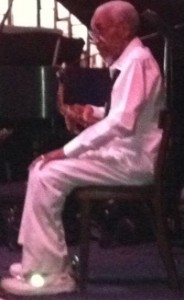 I love Chicago. I love jazz. I love jazz clubs in Chicago; and one of my favorites is Andy’s, a place my wife and I discovered because it has a show that begins before my bedtime. (Being a jazz lover and not being a night owl creates some real challenges for me.) We were recently in the Windy City and had the pleasure of hearing saxophonist Jimmy Ellis’s quartet. (Click here for an article about him.) Mr. Ellis is in his 80’s and is a legend in jazz in his home town, though little known outside of the Chicago area.
I love Chicago. I love jazz. I love jazz clubs in Chicago; and one of my favorites is Andy’s, a place my wife and I discovered because it has a show that begins before my bedtime. (Being a jazz lover and not being a night owl creates some real challenges for me.) We were recently in the Windy City and had the pleasure of hearing saxophonist Jimmy Ellis’s quartet. (Click here for an article about him.) Mr. Ellis is in his 80’s and is a legend in jazz in his home town, though little known outside of the Chicago area.
But I’m not writing about jazz here. I’m writing about a performer who is devoted to the development of his audience and who loves to perform–for them. One of the things that’s cool about taking in the early jazz scene is that parents come with their children. In the crowd that early evening were a couple of families with children. One, sitting close to the front, had brought their two-year-old boy. Mr. Ellis picked him out, conversed with the parents, and acknowledged the child several times, commenting on the importance of growing the audiences of the future. What generated this post, however, was something else he did. At one point, a light bulb clearly went off in his head. He told the band they were going to do “Pop Goes the Weasel.” (Who knew you could make jazz out of that?) While playing, Mr. Ellis moved off the stage, went to their table, and played directly for that young boy. (Fortunately, this was a child who liked music. I can envision some who might be terrified of a saxophonist in front of them. The kid loved it.) I’m not sure if two-year-olds retain memories into adulthood, but I can imagine this being that child’s first retained memory.
You have to visualize this. Mr. Ellis is not a young man. He is not, as some might say, spry. He had a bit of difficulty simply getting up and down from his chair on stage. (Insert your own story about the hard life of jazz musicians here.) Moving into the audience was a considerable effort for him. But he thought about it, he committed to it, and he did it. That spoke volumes about his call to music, his commitment to the future, and his passion for sharing what he does with people.
While I’m certain I read too much into things sometimes, I don’t believe that action was simply about growing new audiences. It certainly was that. But it also had to be about loving the audience, loving those who come to listen, loving performing for them. That is where I think our focus needs to be as we seek to engage with those who come to us and to reach those who do not yet have a relationship with the arts. We need to understand the basic nature of the arts enterprise: skillfully crafted aesthetic experiences presented to improve the lives of those with whom we share this planet. I am convinced that will get us where we want to go.
Engage!
Doug
Photo: Julie Frye
